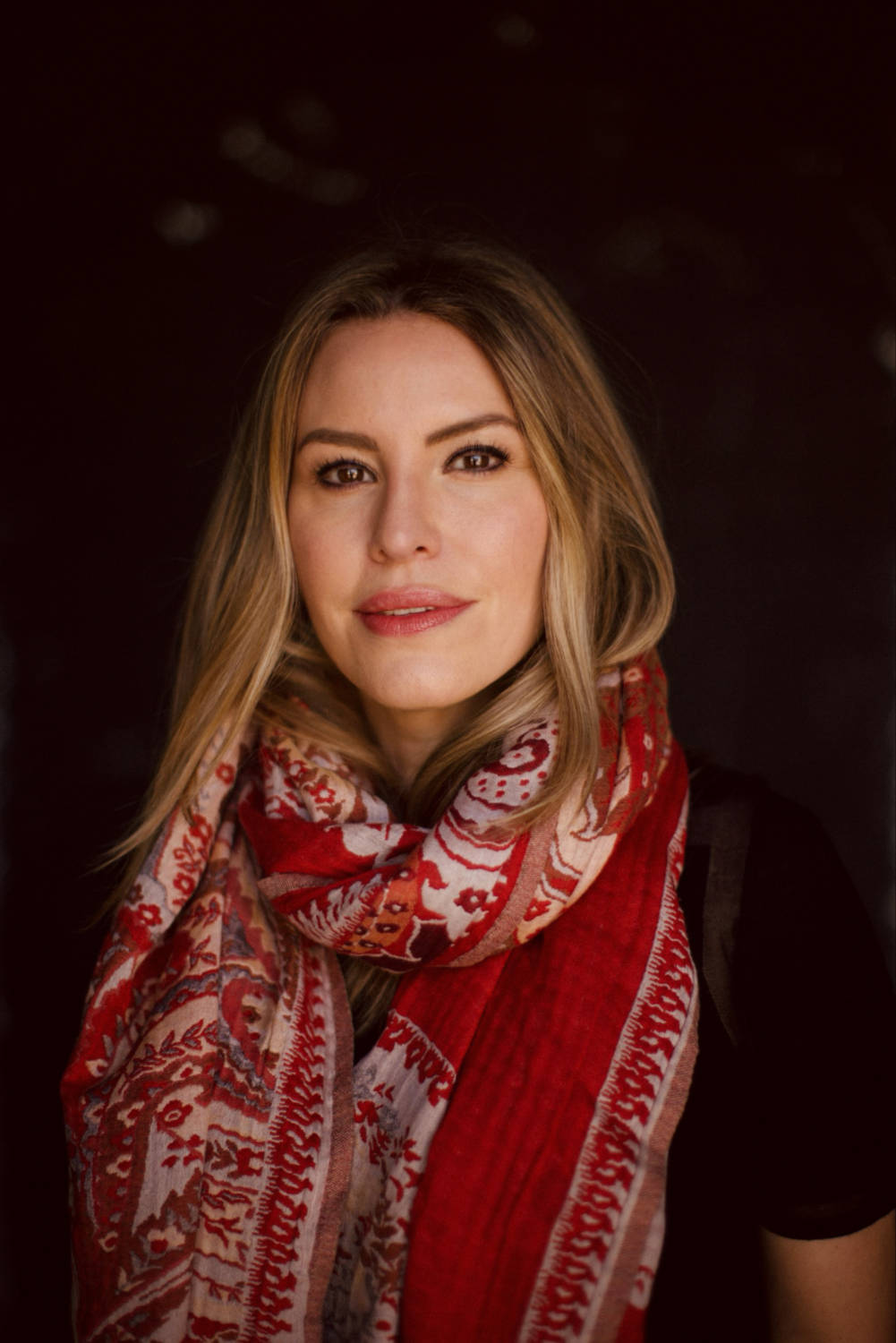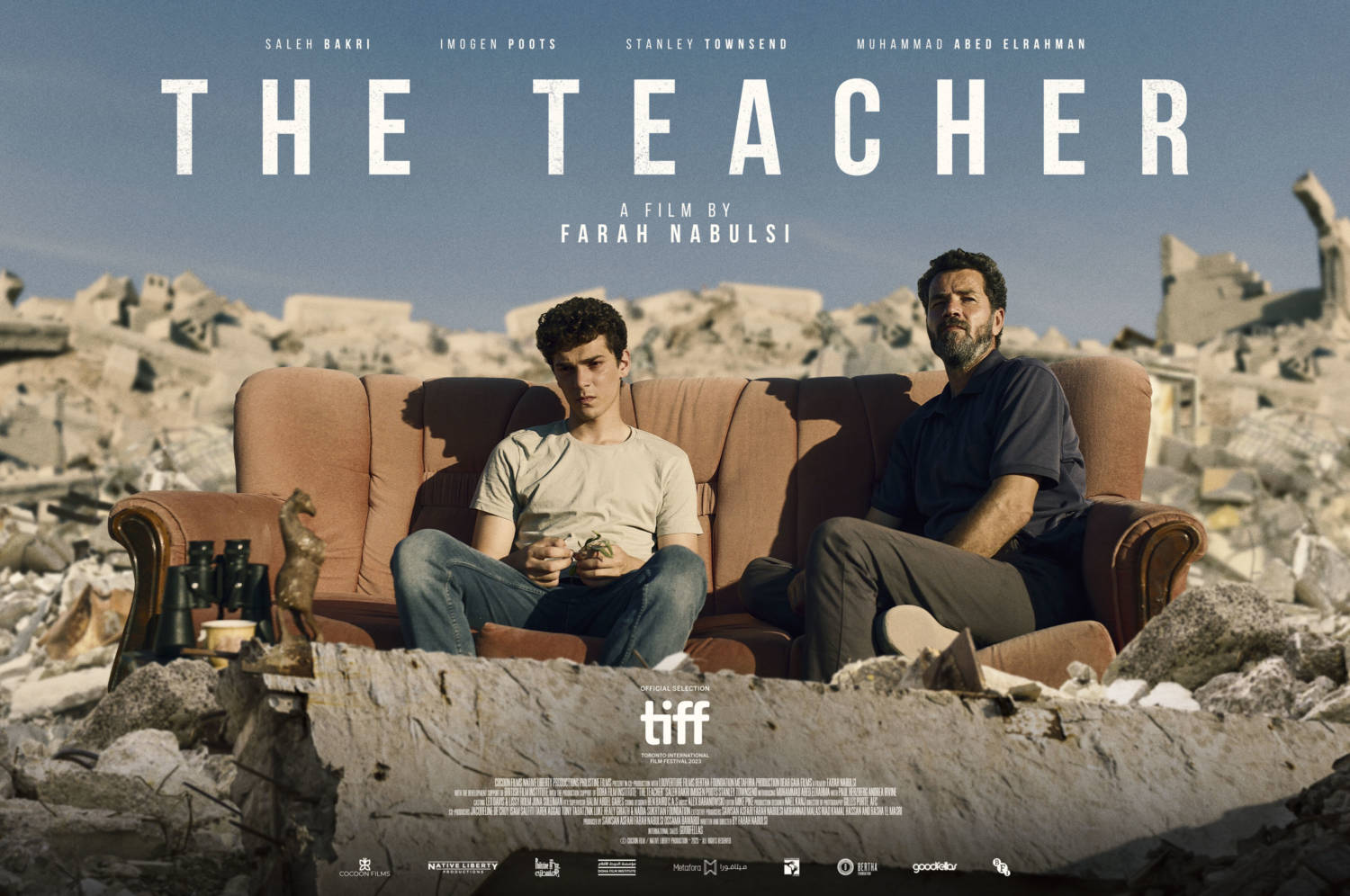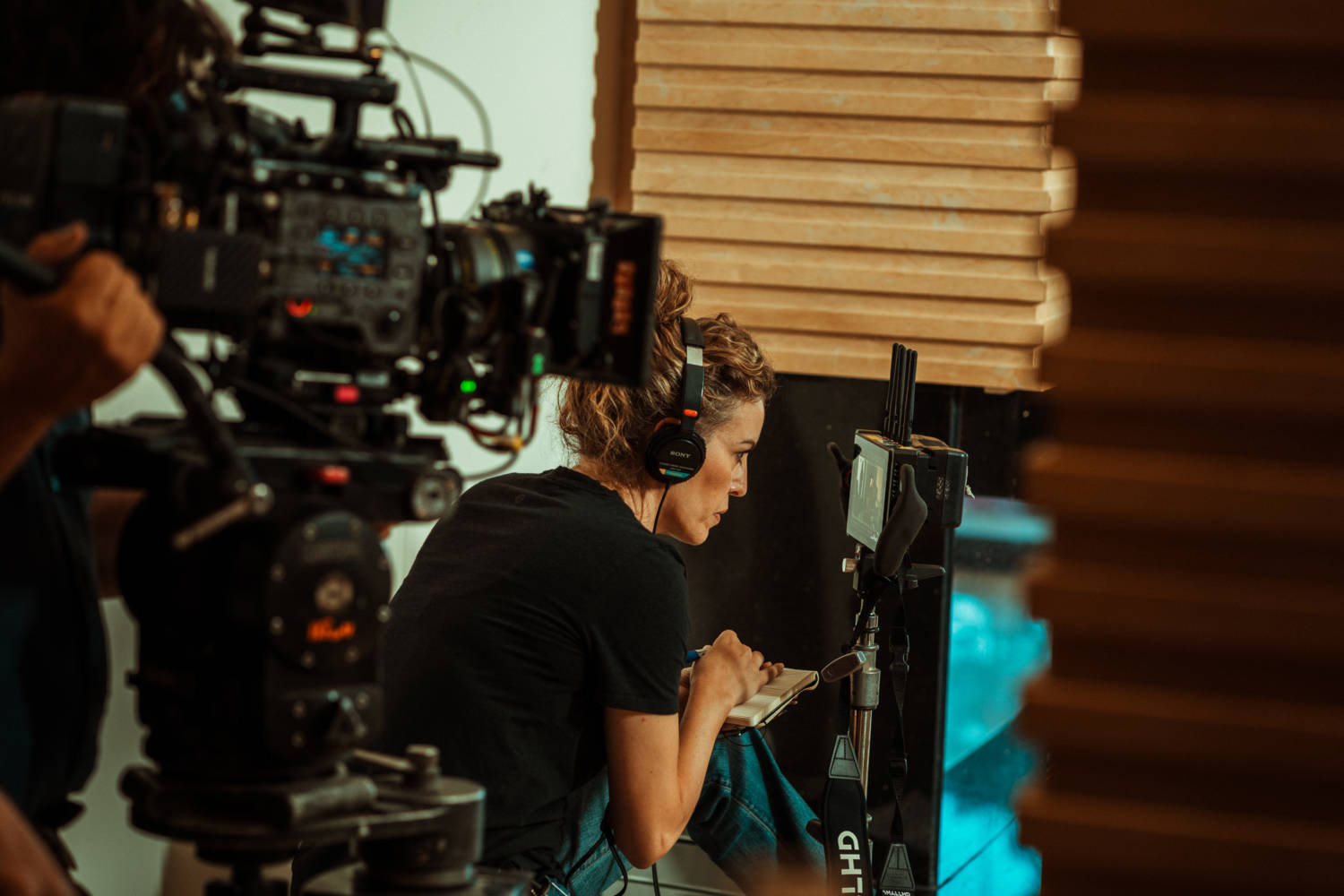Having started a career as an institutional equity stockbroker at JP Morgan Chase, Farah Nabulsi decided to switch professions and become a filmmaker in her late 30s, following a trip to Palestine to trace her family roots.
In 2016, she founded Native Liberty Productions, a non-profit production company, that aims to re-humanise Palestinians and draw attention to the injustices they face.
Now, a powerful voice in cinema, Nabulsi’s work has garnered international acclaim, including an Oscar nomination and a BAFTA Award for her short film “The Present,” which sheds light on the everyday realities of Palestinians living under occupation.
Her latest feature film, “The Teacher,” which she has described as “a human drama set in a political landscape” has been selected for screening in this year’s Cyprus Film Days International Festival (Rialto Theatre, April 17, 8 p.m. and Zena Palace cinema, April 15, 10 p.m.).
In an interview with in-cyprus, she discusses the role of cinema in addressing oppressive realities and her vision for the future of Palestinian filmmaking. She notes that through her films, she not only aims to challenge stereotypes and foster empathy but also to contribute to a narrative that liberates and inspires change. She stresses that filmmaking for her, is a means for creative expression and a way of coping with the pain and injustice she’s witnessed.

What led you to pursue filmmaking?
I’ve always harboured a deep love for film, cinema, theatre and drama, a passion that’s been part of me for as long as I can remember, despite never having pursued any formal education or career in anything from those worlds. My journey into the world of cinema was unexpectedly ignited during a trip to militarily occupied and colonised Palestine. Witnessing firsthand the injustice, discrimination, and the brutal, systematic realities faced by the Palestinian people there profoundly moved me.
Coming from a background where I was born, raised, and educated in the UK, yet rooted in my Palestinian heritage on both sides of my family, this experience was eye-opening. I returned to my life of privilege feeling a compelling need to express what I had seen and felt. Over two years, this need transformed from personal, therapeutic writing into a drive to share these human stories through the most resonant medium I could imagine: film. I dove headfirst into writing and producing my first few short films, which are experimental, abstract, tone poem-like. That leap marked the beginning of my journey in the industry. Then I found the courage also to direct my first short film (“The Present“) which had huge success and recognition at festivals and with audiences worldwide, sparking my evolution into where we are now with my first feature film, “The Teacher“.
This path wasn’t just about finding my voice in filmmaking, but also as a human being; it was about bringing to light the stories that needed to be told, stories rooted in my heritage and the undeniable realities I’d witnessed.
Did your background in finance influence you in your filmmaking career?
While my background in banking and finance might not seem directly influential to my filmmaking career, I’ve realised it has immensely benefitted me since transitioning into the world of cinema. The experience of navigating a male-dominated industry, which both banking and film share, equipped me with the ability to manoeuvre, manage, and lead without feeling intimidated from that perspective. This prior exposure gave me a unique confidence, perhaps not commonly found in those entering such an environment for the first time as women. (Any imposter syndrome I have I think comes more from the fact that I did not go to film school, and nothing to do with being a female).
Additionally, my familiarity with numbers, budgets, and financial management has proven invaluable across the various roles I undertake in independent cinema. Whether it’s raising capital, producing, directing, handling post-production, or marketing, I’m comfortable with all aspects, including the financial aspects that intimidate many. My background as an institutional equity stockbroker also prepared me for pitching—be it presenting my projects for grant funding or engaging with private investors and film financiers. Crafting proposals and convincing stakeholders are skills that have transferred to my current profession, and I am grateful for that. In essence, the tools, skills, and experiences from my finance career have been significantly useful in my journey through the film industry.
How do you perceive your duty as a filmmaker, and a Palestinian filmmaker specifically, in telling stories from Palestine?
The words of an art critic I read once, stating “You cannot make art without a sense of identity, yet it is identity you seek in making art,” deeply resonate with me. This encapsulates my journey as a filmmaker, especially as a Palestinian filmmaker. On one hand, my filmmaking serves as a means of getting to know myself better and as a personal outlet, a means to creatively express myself and cope with the pain and injustice I’ve witnessed. The act of creation is both cathartic and spiritual for me, far beyond a mere duty or responsibility. It’s my way of dealing with personal traumas and societal injustices through art.
On the other hand, my creativity invariably draws me to the subject of Palestine—a reflection of my identity and personal connection to that place on earth. In this sense, I do feel a sense of duty, not just as a Palestinian but as a human being, to lend my skills and artistic expression to stories that matter, and that have depth and meaning. My connection to the material is profound; I aim to work on projects that resonate with me on a personal level, telling important stories about real-life injustices experienced by people I feel connected to or perhaps have experienced myself. In the end, though, it does not always have to be Palestine-related, it just naturally has been so far.
Italian artist Davide Dormino’s view that “true art always had a role and responsibility to take a stand because the fundamental role of the artist is to help people shape their point of view in a way that liberates us” aligns with my belief in the transformative power of art. As an artist, I see it as my role to contribute to a narrative that liberates and enlightens, steering away from art that merely serves an aesthetic function, is purely entertaining or caters to vanity. My work as a filmmaker, particularly concerning Palestinian narratives, is driven by this ethos—to tell stories that are not only personal and meaningful but also liberate and potentially inspire change.
What role can cinema play in this ongoing war?
Honestly, I cannot call this a ‘war’. It simply is not. When 15 of the sharpest legal minds on the planet in the highest court on the planet at the ICJ have unanimously deemed what Israel is currently doing in Gaza as a ‘plausible genocide’ – the crime of all crimes, I think given Israel’s track record of illegal military occupation, colonisation and apartheid (a crime against humanity and according to the most credible human rights organizations in the world), Israel does not deserve the benefit of the doubt, and millions of people’s lives are in the balance.
As to the question, I believe cinema holds a unique and powerful role in addressing oppressions and oppressive realities, a role it has played for decades, not just in relation to Palestine of course. I strongly believe that cinema is one of the most profound and beautiful means of meaningful human communication and art forms ever known. It possesses the unparalleled ability to challenge stereotypes, overcome misconceptions, and transcend borders in a way that no other medium can. Cinema raises the conscience and consciousness of humanity, utilising today’s technology to reach every corner of the globe. (Of course, it can do the exact opposite as well!)
This capacity of cinema is especially pertinent to the ongoing situation in Palestine, both before and after the horrendous events of October 7. The injustice faced by Palestinians is not new; it has been a painful reality for decades. In this context, cinema can serve as a powerful tool for bringing these issues to the global stage, fostering understanding and empathy among audiences worldwide. Something I believe and hope my current film THE TEACHER has the capacity to do at this crucial juncture in the discourse.
Your films explore the universality of hope and resilience in hardship. Why is it important to tell these stories?
Hope and resilience amidst hardship, to me, resonate with the core of the human experience. Drawing inspiration from James Baldwin’s words, “I cannot be a pessimist because I am alive. To be a pessimist means that you have agreed that human life is an academic matter. So, I am forced to be an optimist. I am forced to believe that we can survive, whatever we must survive,” I find a profound alignment with my own outlook. Baldwin’s perspective encapsulates the essence of optimism in the face of adversity because there is no other choice as he sees it, is a sentiment that deeply influences my filmmaking.
This notion of optimism isn’t just a narrative choice; it’s a necessary stance for survival and a way to honour the human spirit’s capacity for hope and resilience. This hope is crucial, especially for those directly enduring such trials, sometimes being the only beacon guiding their resilience and perseverance. Though not overtly present themes in my work; it’s a testament to the indomitable will of those who continue to fight and survive. Therefore, hope and resilience are not merely artistic choices but vital lifelines that weave through the narratives of my films, reflecting the enduring spirit of the humanity of Palestinians and their quest for justice and freedom.
Palestinian cinema is gaining recognition worldwide. What are your hopes for the future of Palestinian filmmaking?
I believe Palestinian cinema, with its rich stories and burgeoning talent, holds immense potential that even transcends the incredible work we have witnessed so far. The unique challenges faced by Palestinian filmmakers extend beyond the typical hurdles of independent cinema, encompassing a lack of infrastructure, freedom, funding, and government support that many other nations provide to nurture their cinematic artists. Despite these constraints, and the fact that there is no actual Palestinian film industry per se —amplified by the backdrop of oppression, restraint, and obstacles inherent in a place that is occupied and colonised —it’s remarkable how far Palestinian cinema has reached on the global stage.
Looking to the future, I harbour hopes for a developing Palestinian film industry that can explore narratives beyond those inherently viewed as politically charged, sometimes simply due to their origin. While the political context of Palestine unavoidably colours its cinema, there’s a desire to broaden the thematic scope. This includes telling stories that reflect other facets of the human experience and the diverse dynamics of Palestinian life, not solely defined by oppression, and the melancholy these elements foster.
I envision a future where Palestinian cinema can also celebrate more positive stories and themes, enriching the global film landscape with the multifaceted potential of Palestinian filmmakers.

(Pictures provided by Farah Nabulsi)
Read more:






